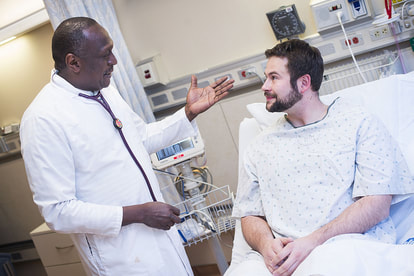 Doctor speaking with a patient (NIH Clinical Center)
Doctor speaking with a patient (NIH Clinical Center)
|
|
Are there any minimum requirements to participate in a cord blood clinical trial?
Minimum requirements vary greatly from one study to the next. Many cord blood clinical trials are available to children (with parental/guardian consent, of course). Is participation limited only to those who privately banked their child's cord blood? No. Depending on the study, researchers may be using donated cord blood. Will I get paid for participating in a clinical trial? You will not necessarily be paid for participation in a clinical trial. Some studies may offer payment, stipend or compensation for expenses. Others do not provide any financial compensation to participants. If this is important to you, please clarify the terms of participation prior to registering. Likewise, you should review the terms with your insurance provider prior to officially participating as they may or may not be willing to help. |
|
- What is the goal or purpose of this clinical trial?
- What "phase" is this study? - Who is sponsoring this study? - Who is the Institutional Review Board (IBR) for this study? - How long will the clinical trial last? - What short term / long term benefits are expected? - What short term / long term risks are expected? |
- Does this trial build on previous results? If so, what exactly?
- Does this trial include a "compassionate use" program ensuring that participants will have access to the treatment even prior to market release? - What is the protocol for the study? What is required from the participant in terms of appointments, medicine, reporting, tests, restrictions, contraindications, etc? |
|
About the photo in the top banner:
Diane Paradise is a 5X cancer survivor and cord blood recipient. After a long struggle with Hodgkins Lymphoma, she was given the opportunity to participate in a clinical trial. She was very fortunate. The decision to participate in this particular study saved her life. |
About Save the Cord Foundation
Save the Cord Foundation, a 501c3 non-profit organization, was established to promote awareness of the life-saving benefits of cord blood based on unbiased and factual information. The Foundation educates parents, health professionals and the general public about the need to preserve this valuable medical resource while providing information on both public cord blood donation programs and private family cord blood banks worldwide. Learn more about our global community.
|
Show your SupportOur mission depends on supporters like you. Please support our cause by making a donation or promoting our website and message where you can. We appreciate all the support!
|
Join the conversation
|
